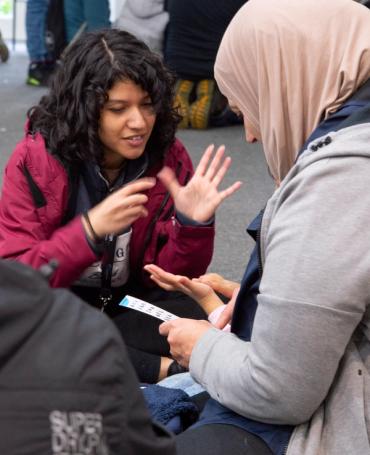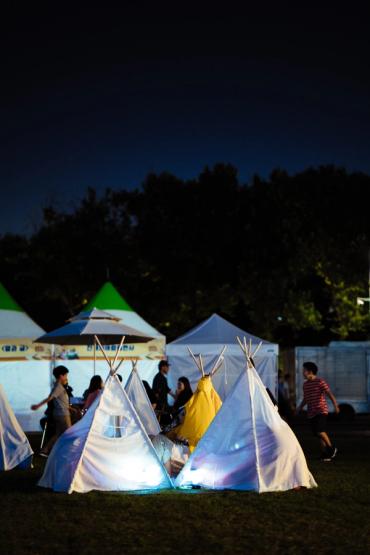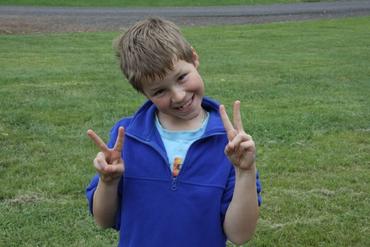My story, my career path - Brent Rogers
Brent is an employment consultant. He enjoys reading and is passionate about teaching Auslan.

Tell us about your diagnosis as a child?
I got chicken pox at 3 years old and an ear infection which severely impacted my hearing loss, through that, the doctor was able to diagnose me with Mondini dysplasia, which was a big contributor to my hearing loss too.
If and what age were you fitted with a hearing aid or cochlear implant and what was that like?
I was fitted with hearing aids at 15 months old, my condition prevents me from wearing cochlear implants and it’s like amplifying the sounds into my ears at a maximum level to hear “normal” noises, almost like turning your music speakers on to 100% all the time and you have to listen to it all day long.
Are you oral and if so, what was your experience like learning spoken language?
I learnt spoken (oral) language at home as I was able to have a functioning voice to speak clear enough and be able to converse with my parents as they cannot sign on a normal level.
Do you use Auslan, why did you decide to learn and at what age?
Auslan was not around when I was born, it came about when I was in primary school, so I started with Signed English, and it was natural to learn that as soon as I entered pre-school and kindergarten as it’s our language first above others.
How did you communicate within your family and amongst friends?
I speak verbally with my family and I sign all the time with my friends.
Tell us about going to school - what was that like? What were the worries you had that you remember?
Primary school was a breeze, simple and fun, how it should be but high school was confusing for me, because it was usually like my parents’ expectations versus the schools’ expectation, I was stuck in the middle and couldn’t understand the politics behind that, due to the lack of information and there was no clear indication of what will happen if I make a decision, so I was constantly under pressure to perform exceptionally well AND communicate with my bilingual language (spoken English, written English and Auslan) that I was still learning and improving from. I worried a lot about what my family isn’t telling me and I worried a lot about what my teachers weren’t telling me, my questions weren’t being answered directly or they didn’t help me understand it well, and I worried that the education I was receiving wasn’t going to motivate me or challenge me enough, because of that presumption or traditional belief that we cannot learn the same way as hearing students do, I wanted to be the best student but I felt that I wasn’t getting enough appropriate support to achieve my potential from the school’s side, an issue that I noticed that was widespread over Australia that impacts most Deaf student, I was just one of them and no different to the others. On the other hand, I had some genuine teachers who saw my potential and wanted the best for me, and a few of them have tried to make sure that I’m getting the highest education possible. My education provided at the deaf schools were constantly below my potential levels, so the only way I could improve and actually learn was to attend hearing classes at private schools for specific subjects, like English, Drama, Chemistry, learn their education which was on a completely different scale compared to deaf schools, and do it on my own, with teachers who can sign Auslan and have to give up their own time to help me, not with professional interpreters. It was often a strange and difficult phase for me, being the only one to come to a class full of hearing students, with a hearing teacher who is experienced in teaching the hearing way, they had no interest in getting to know me and I had no interest in getting to know them, because I only have time to learn and then when classes finish, I have to pack up and go back to my school, and be able to use my language to feel “normal” again but I knew at the same time, I wasn’t getting the education I needed from my school. It’s sufficient to say, I struggled a lot because I couldn’t decide what is the best for me, what makes me feel good about it and if it’s going to be good enough for myself, I hated being indecisive and I didn’t want to depend on other people to make those decisions for me but I needed the best education available so I can grow and understand better. It’s also bizarre when you are in the same class as your peers but they are not learning what you’re learning, so you end up feeling like an outcast. I was not aware of what co-ed or mainstream meant that time, I was naive and I was trying to figure out my Deaf identity too and what it means to be Deaf.
And tell us about going to Uni or TAFE - what was that like?
It was a major personal battle for me, as the TAFE was not used to having a profoundly deaf student who depends entirely on Auslan interpreters to learn about computers and watch lectures, it was like I had to teach the TAFE how to work with me and understand what works for me, I had to rely on my English reading and writing capability to understand what’s going on, even with words and sentences that I had never learned before, I had to teach myself to understand them and with my parents’ help, it’s learning from a spoken language to a written language, even the pronunciation don’t make sense to how it’s written down to me but I had to work that out altogether and learn at the same time. The ignorance was huge, and only a teacher or two was willing to work with me and understand how I learn visually, sometimes I would go classes without interpreters because of their lack of responses, lack of interpreters or they made mistakes, and I’m handicapped automatically which frustrates me a lot. I felt completely alone and underrepresented in that progress, at some point, I could feel like I’m drowning in isolation and the pressure is overwhelming, getting tired of fighting for myself day by day, I even contemplated giving up at some point, but I was reminded of my resolve and a strong belief that “if it’s hard enough, it’s worth enough” by my parents who were the only ones who believed I was capable of accomplishing anything I set my mind to, despite our level of communication and I can sense they genuinely meant every word, fuelling my drive to succeed. You’re only your best if you have people next to you cheering you on or pushing you from behind. It was considered one of the worst and best times in my experience.
What influenced your career choices?
Getting qualifications in the computer or I.T industry seems sensible for me as it provides me the tools I need to pursue something, it allows everyone to communicate differently instead of relying on the phone and I thought that if I can understand the language, then I can understand a lot more things better in a systematic and logical way as well as have the clear view of what’s going on. Now I am influenced that there is a lot of gaps in the employment market and I want to advocate for those underprivileged participants who is lost in those gaps or unable to gain employment on their own.
Do you love what you do?
It depends on what it is, if it is helping the Deaf/Hard of Hearing community, then yes, I believe in paying it back to the community who gave me my Deaf identity and giving them what I have learnt and grew up with, and that my story will be able to help others or spread awareness to the other communities, that’s what I would love to do. I also love teaching Auslan, it is always rewarding to see others learning that so they can talk to us.
What are your main challenges?
My main challenge is getting people to listen to me and understand me as a Deaf person, and relate to me in many ways, that had never changed since I was little, and another challenge could be, how can I change that myself or what can I do to make it better for the others so they can get the same treatment as me.
And how did you overcome them?
I try to read literature as much as I can, I try to learn what is considered valuable knowledge and valuable experiences on the Internet, if I can know as much as the other hearing people, then I have a fighting chance to make things right for myself, and I try to show through my actions that respect and empathy can go a very long way, no matter how much intelligence we have.



